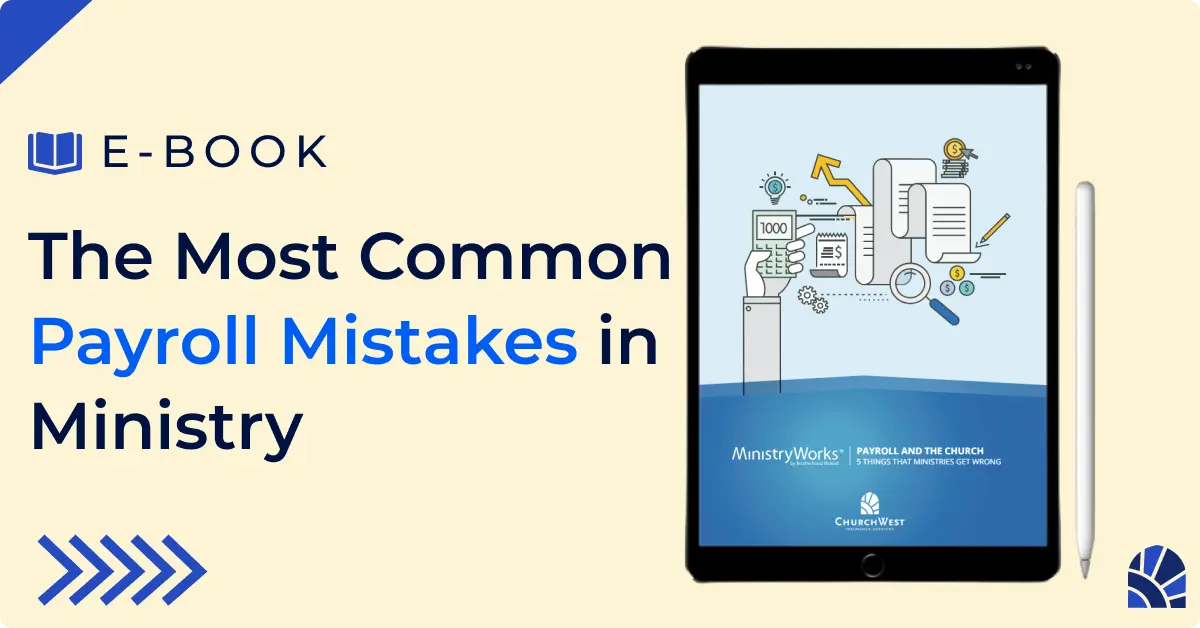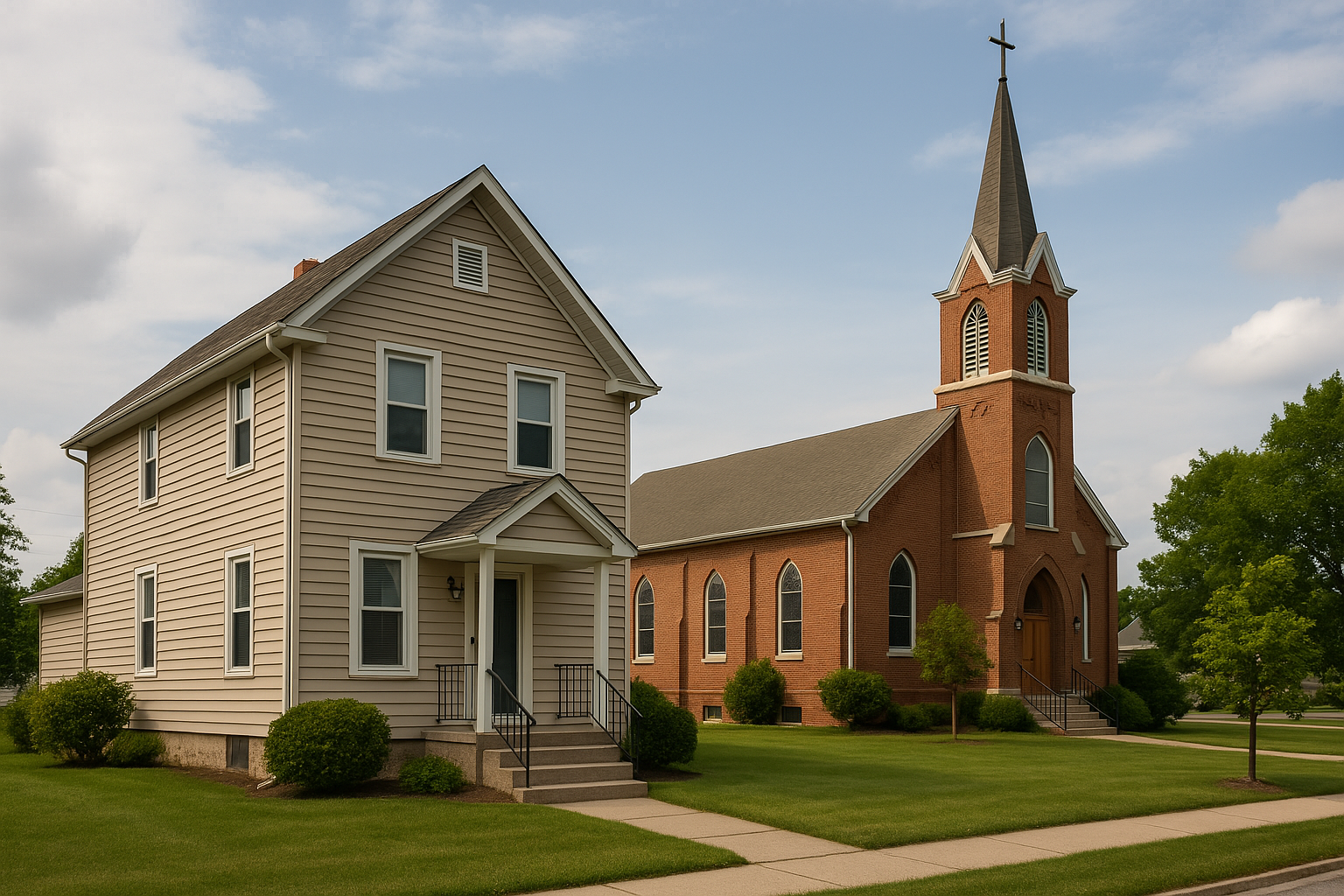What is the Clergy Housing Allowance?
The Clergy Housing Allowance (aka parsonage allowance) is a unique benefit under the US tax code that allows ministers to exclude housing expenses from their gross income for tax purposes.
As the most widely applied tax benefit for US pastors, the Clergy Housing Allowance saves ministers across the US more than $800 million dollars a year in taxes. The allowance does not apply to self-employment taxes.
Note: The following article is intended purely as general information for public use and not as tax advice. For tax guidance specific to your ministry, please contact your tax professional or a payroll service provider like MinistryWorks.
Is Clergy Housing Allowance Taxable?
Many often misunderstand the term “clergy housing allowance”. Some common, but slightly misguided questions, may include:
- Is housing allowance taxable?
- Does housing allowance count as income?
- Do clergy pay taxes on housing allowance?
The answer to these questions depends on whether you’re discussing housing allowance as income or as a tax exemption.
Housing Allowance as Income
Most people think of allowance as a payment made to an employee to cover certain expenses, such as a stipend or a fringe benefit of employment.
In the secular world, housing allowance will usually refer to company provided housing. For example, a law firm may include a company condo as a perk of employment for a new hire. This type of housing allowance would then be treated as taxable income for the employee, based on the annual fair rental value of the company provided lodging.
Housing Allowance as a Tax Exemption
The Clergy Housing Allowance is not a payment. Instead, it is a designation of funds towards a clergy specific tax exemption.
Let’s break down the major categories of clergy housing allowance:
Parsonage and Parsonage Allowance
What is a parsonage? A parsonage is a home that the church provides a pastor to live in rent-free as reasonable compensation for their ministerial services.
While secular employees would normally be taxed on the fair rental value of the company provided housing, pastors are exempt from this requirement.
They may also exempt additional parsonage related expenses such as utilities, repairs and furnishings as long as the employing church as designated those funds in advance and the exempt income does not exceed the fair rental value of the parsonage.
Rental and Housing Allowance
For pastors not living in a church-provided home, there are two additional allowances available:
Rental Allowance: Pastors who rent a home or an apartment will not pay federal income taxes on the amount of their compensation that is designated for rental expenses by the employing church. This can include the cost of rent, furnishings and utilities.
Housing Allowance: Pastors who own their own home can also exempt pay from federal income taxes as long as the employing church has designated those funds for housing expenses. Just like renters, that includes utilities, furnishings and mortgage costs.
Eligibility for the Clergy Housing Allowance
For an employee to qualify as a minister for the clergy housing allowance, they need to meet 2 criteria:
- They must be considered a minister by the US tax code.
- They must be compensated for duties which fit the ordinary responsibilities of a minister.
Similar to the legal doctrine of the ministerial exception, it is not enough to merely give someone the title of pastor or minister to qualify them for this benefit. Crucially, misapplying the clergy housing allowance to non-ministerial staff can result in back taxes and penalties for those who claim the benefit in error.
If you have questions about who in your ministry is actually considered a minister, we recommend contacting your human resources, taxation or legal advisor.

How Much Can a Pastor Claim for Housing Allowance?
To figure out how much a pastor can claim in housing allowance, you must use the lowest of the following amounts:
- The amount designated by the employing church: This is the portion of the pastor’s salary that the church has officially designated as a housing allowance.
- The amount the pastor paid in approved housing expenses: This includes actual costs incurred for housing, such as rent or mortgage payments, utilities, repairs and furnishings.
- The fair rental value of the home, apartment, or parsonage: This is the amount it would cost to rent a similar home in the same area, including furnishings and utilities.
Example Scenario
Let’s consider this example.
Scenario: Pastor John requested that his employer church designate $30,000 of his $60,000 annual salary for housing allowance. During the year, Pastor John incurred the following housing expenses:
- Mortgage payments: $20,000
- Utilities: $3,000
- Home insurance: $1,500
- Repairs and maintenance: $1,000
Total housing expenses: $25,500
Pastor John also determines that the fair rental value of his home, including utilities and furnishings, is $25,000 per year.
To determine how much Pastor John can exclude from his gross income for the housing allowance, he needs to take the lowest of the following amounts:
- Designated allowance by the church: $30,000
- Actual housing expenses: $25,500
- Fair rental value: $25,000
In this case, the lowest amount is the fair rental value of $25,000. Therefore, Pastor John can reduce his $60,000 income by $25,000 giving him a total taxable income of $35,000 for federal income tax purposes.
There is no upper limit on how much a church can designate for a pastor’s housing allowance. That said, the actual allowance is always restricted to both the fair rental value of the pastor’s residence as well as the actual expenses paid.
Your church should keep the designated amount within a reasonable range to avoid any scrutiny by the IRS for “unreasonable compensation”. The amount should also offer enough flexibility so that your pastor does not miss out on any tax savings.

How can our church get started with clergy housing allowance?
If you’re not already offering housing allowance to your pastor, they are most likely missing out on significant tax savings.
Experts recommend designating the housing allowance before the end of the calendar year and the start of the new one. The church can amend the housing allowance midyear but only on a going-forward basis. If your church forgets to complete this task ahead of the new year, it will mean less tax savings for the pastor in question.
There are several methods your church can use to officially designate the allowance, including updates to the employment contract, official minutes or even an official resolution by the church.
“The designation of an amount as rental allowance may be evidenced in an employment contract, in minutes of or in a resolution by a church or other qualified organization or in its budget, or in any other appropriate instrument evidencing such official action“
§ 1.107-1 Rental value of parsonages (b)
Regardless of how you make the decision, it’s critical to document the action and maintain records going forward in case of any potential IRS audits.
What Items are Excluded from the Clergy Housing Allowance?
The most common expenses that are eligible for the housing allowance are those that are necessary in furnishing and maintaining a home. That can include basic expenses such as rent or mortgage payments, insurance, utilities, appliances and furniture.
Personal expenses such as food, cleaning services, toiletries, clothing, etc. are not eligible for the allowance. Many churches require the pastor enjoying the allowance to present an itemized worksheet of the exact expenses that justify the designated allowance amount.
Does our Work Comp Audit Include Housing Allowance?
While the housing allowance can reduce a pastor’s personal income tax burden, it has no impact on the employing church’s worker’s compensation audit.
When completing a worker’s comp audit, the church must report the pastor’s full, regardless of the housing allowance. This also includes the annual fair rental value of any parsonage living spaces provided by the church.
Inaccurate worker’s comp reporting can result in inadequate coverage as well as penalties on future worker’s compensation audits.
Further Insurance Considerations
Understanding and correctly applying the clergy housing allowance is critical for ensuring compliance with tax regulations and protecting the church from potential legal and financial repercussions. The church has a responsibility to accurately designate housing allowances only for those who qualify, avoiding common pitfalls that can lead to significant issues.
Consider the following example. A church incorrectly designates a housing allowance for a non-ministerial staff member for several years. After the staff member files their taxes, the IRS conducts a random audit. As a result of the audit, the employee faces significant back-taxes and penalties for wrongly claiming the housing allowance. As a result, the employee sues the church board for financial damages, claiming misrepresentation and negligence.
This scenario underscores the need for Directors and Officers (D&O) insurance. D&O insurance protects the church’s leadership by covering legal defense costs and financial damages in the event of lawsuits arising from leadership decisions and actions. It provides a safety net for church leaders and protects their personal assets as they fulfill their responsibilities.
Learn more about Director’s & Officers insurance coverage.
Closing Thoughts
The clergy housing allowance is a significant tax benefit that provides financial relief for ministers by excluding housing expenses from their taxable income. However, understanding and correctly applying this allowance is essential for compliance with IRS regulations and avoiding legal and financial repercussions.
For more ministry risk management guidance, request a quote and see how a ChurchWest insurance agent can help you solve the biggest risks in ministry.






